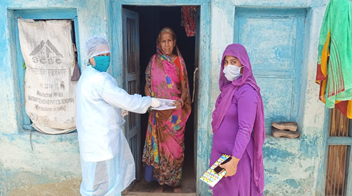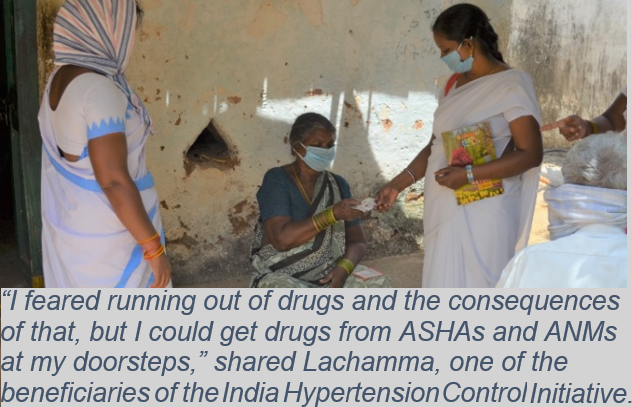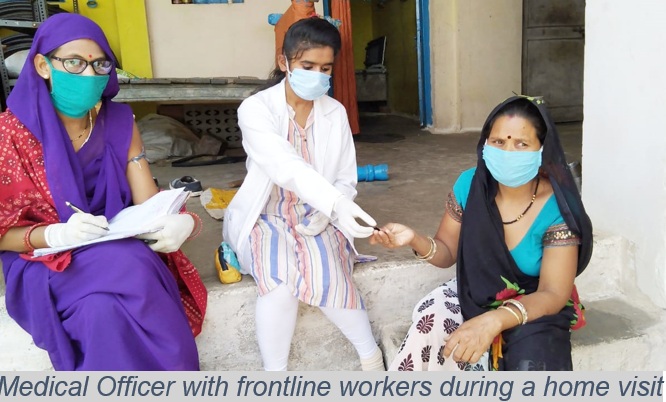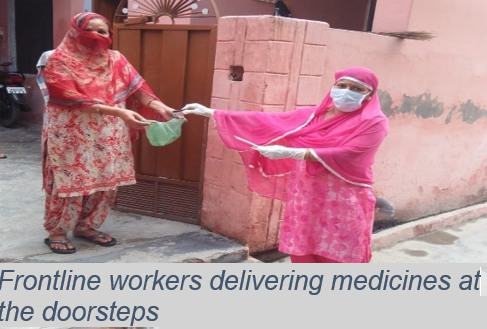
Lachamma, a 65-year-old woman suffering from hypertension usually goes to the primary health center (PHC) for her routine monitoring of blood pressure and monthly drug refills. She has been taking medicines for the past year without any hindrance. With the outbreak of COVID-19 and lack of public transport, Lachamma had no means to visit the health center. With only six days of drug dose left, she was anxious as missing her medication may lead to symptoms like palpitations of the heart, headache, and nervousness, etc. Patients with comorbidities such as hypertension and diabetes are at higher risk of becoming severely ill with the novel coronavirus. With COVID-19 impacting health services significantly, the continuum of care for non-communicable diseases (NCDs) has been significantly affected as most of these patients are unable to access routine health services.
India Hypertension Control Initiative (IHCI)
A multi-partner initiative by the Ministry of Health & Family Welfare, state governments, World Health Organization (WHO) Country Office for India, Indian Council of Medical Research (ICMR) and Resolve to Save Lives, an initiative of Vital Strategies, launched in 2017, aims to reduce premature cardiovascular deaths by strengthening hypertension management and control using evidence-based strategies. By June 2020, IHCI had been implemented across 31 districts in six states (Kerala, Madhya Pradesh, Maharashtra, Punjab, Telangana, and Chhattisgarh) and planned to be scaled up to 100 districts across all states in the country.
Access to health services at the doorsteps through decentralization
Recognizing the disruption in access to essential health services, the India Hypertension Control Initiative adjusted its approach of drug dispensing strategy to improve patient-centric care, maintain the continuum of care, and treatment adherence. Under the initiative, access to routine health services was improved through the decentralization of routine services such as blood pressure monitoring and drug refills at the Health and Wellness Centres (HWCs). These strategies led to a significant improvement in regular patient follow-ups at HWCs and patient compliance with their medications.
According to the monthly registration data of new hypertensive patients under IHCI, a massive 76% reduction was reported in the number of patients registered during the initial phase of the lockdown as compared to the period before lockdown. However, a gradual improvement was seen in new patient registration as close to 37% patients started accessing health services at their nearest HWCs during the later phase of the lockdown.

“COVID-19 patients with comorbidities such as hypertension, diabetes, and heart disease are at increased risk of severe illness, therefore maintaining the continuity of essential health services is paramount. 70% of the patients are under treatment with protocol medications in Nagpur Division. We acknowledge the support of the WHO-IHCI team in implementing the doorstep delivery strategy”, shared Dr Sanjeev Kumar, Divisional commissioner Nagpur, Maharashtra.
Doorstep delivery of services by frontline health workers
 IHCI team developed a framework to ensure that patients get their monthly drug refills during the lockdown. Advocacy was done at the state & district levels for programmatic decisions facilitating drug distribution through frontline health workers such as mid-level health providers (MLHPs), Auxiliary nurse midwives (ANMs), accredited social health activist (ASHAs). The healthcare team at HWCs and sub-health centers mobilized drugs for further distribution to the patients, using the IHCI line list of patients. ASHAs and ANMs went door to door as per the IHCI line list and delivered the medicines at the patient’s doorsteps. To avoid visits to health facilities, medicines were provided to patients for an extended duration, based on the availability of drugs. Cardio-vascular health officers (CVHOs) under IHCI supported estimation of the necessary quantity of drugs required and coordinated with the district and state governments for timely supply. Senior treatment supervisors (STSs) monitored the community distribution through telephone calls to staff nurses, ANMs, and patients regularly.
IHCI team developed a framework to ensure that patients get their monthly drug refills during the lockdown. Advocacy was done at the state & district levels for programmatic decisions facilitating drug distribution through frontline health workers such as mid-level health providers (MLHPs), Auxiliary nurse midwives (ANMs), accredited social health activist (ASHAs). The healthcare team at HWCs and sub-health centers mobilized drugs for further distribution to the patients, using the IHCI line list of patients. ASHAs and ANMs went door to door as per the IHCI line list and delivered the medicines at the patient’s doorsteps. To avoid visits to health facilities, medicines were provided to patients for an extended duration, based on the availability of drugs. Cardio-vascular health officers (CVHOs) under IHCI supported estimation of the necessary quantity of drugs required and coordinated with the district and state governments for timely supply. Senior treatment supervisors (STSs) monitored the community distribution through telephone calls to staff nurses, ANMs, and patients regularly.
IHCI has enrolled more than 8 lakh beneficiaries in the six project states, providing access to standardized care for hypertension, and the availability of effective free medicines. Initial data indicates that out of total registered patients under IHCI, about 52% of patients received antihypertension drugs through community distribution at their doorsteps, during April and May 2020. Community distribution is being continued in these IHCI districts to cover all the beneficiaries by collective efforts from the WHO-IHCI team and the state governments.
“In Telangana, the drug delivery was facilitated by ANMs during the lockdown. With the technical support of the WHO team under the IHCI project, we were able to effectively monitor and implement this strategy and as a result, approximately 52% of the total patients received drugs from the public sector during the lockdown period”, shared Dr Yogita Rana, IAS, Commissioner of Health & Family Welfare and Mission Director NHM, Telangana State.
Capacity building of the frontline workers
To manage the pandemic and lessen its impact, the government took strong policy decisions and innovative initiatives to ensure that high-risk groups are provided access to essential health services. The role of the WHO team in advocacy provided the much-needed impetus to develop feasible solutions such as the capacity building of the frontline workers to ensure the continuum of care to patients.
 The health workers were provided hands-on training to give drug refills and monitor the blood pressure. High-risk patients were advised to consult a medical officer through teleconsultation or referred to the PHC for drug escalation. Monitoring was done by CVHOs & STSs in the areas of drug distribution & consumption, verification of drug refills through phone calls.
The health workers were provided hands-on training to give drug refills and monitor the blood pressure. High-risk patients were advised to consult a medical officer through teleconsultation or referred to the PHC for drug escalation. Monitoring was done by CVHOs & STSs in the areas of drug distribution & consumption, verification of drug refills through phone calls.
"We have delivered medicines to almost 1350 Hypertensives in the last month in our block through HWCs and community distribution during the lockdown. HWCs were operational throughout the week considering the need for people,” shared Dr. Navjyot Singh Bhullar, Senior Medical Officer, Khialakalan, Mansa, Punjab.
“WHO provided significant support in the implementation of the IHCI project which has been extended to all the districts in Punjab. Free of cost essential medicines are being distributed at the patient’s doorstep by frontline workers, thus minimizing the morbidity and mortality due to conditions like hypertension and diabetes”, shared Mr Balbir Singh Sidhu, Health Minister Punjab.
The lessons learned and positive outcomes of this initiative will be expanded to other states through advocacy and risk communication to mitigate the long-term impact of COVID-19.
